The Human League – The 13th Floor Interview
It’s been 37 years since 17-year-old Susan Ann Sulley was spotted by Phil Oakey in a Sheffield nightclub with her friend Joanne Catherall and recruited to join The Human League.
37 years later and Susan is still a member of The Human League and still living in Sheffield.
The 13th Floor’s Marty Duda spoke to Susan Ann Sulley as she, Joanne and Phil prepare to make their New Zealand debut on Wednesday, December 6th at the Logan Campbell Centre along with Pseudo Echo.
Click here to listen to the interview with Susan Sulley:
Or, read a transcription of the interview here:
MD: You’ve been in Sheffield all your life; is that right?
SAS: That’s correct, yes.
MD: What is the appeal of Sheffield, as someone who’s never been there?
SAS: I think it’s just where I was born. I’ve never had any reason to leave, if you understand what I mean: my friends are here; the jobs manage to work from here with no problem whatsoever; if anything, I think that’s been a good thing – not being in London and getting caught up with all the things that go on in London – and so, I’ve just never really thought about moving, to be truthful.
MD: That’s alright! What kind of town is it?
SAS: It’s a city. It’s quite a large city, but it’s very green. There are lots of fields; and where I live – I live right on the edge of Sheffield, on the corner of Derbyshire – and it’s very green, and we look out onto horses, and things like that. It’s very pretty, but it’s not very good for shopping – that’s the only thing – but fortunately, Manchester’s not very far away, and that’s very good for shopping.
MD: Oh, excellent! Well, that sounds good. The greenery sounds nice.
SAS: Yeah, well, it’s very wet. It can be very wet.
MD: You’ll probably like it in New Zealand then, because it’s very green here, and it’s pretty wet as well.
SAS: Right, okay. We were hoping for some sunshine!
MD: Well, it might be that way by the time you get here, you never know, because it will be close to summertime in December. This is the first time you’ve been in New Zealand; is that right?
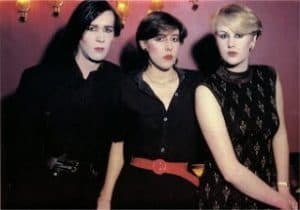
SAS: It is! We’ve… been to Australia quite a few times, but we’ve never made it to New Zealand; so, this is a first for us. Yeah, we’re all really looking forward to it!
MD: I think you’ve got a lot of fans here really looking forward to seeing you; so, it should be a pretty big event when you get here.
SAS: Oh good! We hope so.
MD: I just went to an ‘80s mania show over the weekend, and it was interesting, because they had a group of British acts – like Paul Young and Go West and Cutting Crew – and then, closing the show, was American singer Taylor Dayne, who was from the later part of the ‘80s… and I noticed it seemed like – as far as music from that era – people could be very divided: they were really into Paul Young and Go West; not so interested in Taylor Dayne, because it was just that wrong cut off point. I was wondering if you ran into that – being an act from the early to mid-‘80s – and you found that audiences were kind of fickle, as to what part of the whole thing they were interested in?
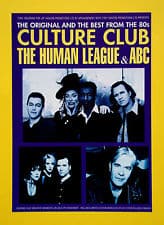 SAS: To be very fair, it’s not very often that we do those “’80s” things. We do a lot of festivals – we do an awful lot of festivals – especially in the UK and Europe over the summer, but they’re very mixed, and they can be old, and they can be someone who’s in the charts now; so, we tend not to do a lot of those “’80s” things. When we do do the”’80s” things – as you said – there is a point where we’d never done anything with anyone that wasn’t like you say. We’ve done loads of things with Go West, with Paul Young, with ABC, with Tony Hadley from Spandau, and all those people that are all in the same sort of era; but the Taylor Dayne thing: I can remember the song in my head…
SAS: To be very fair, it’s not very often that we do those “’80s” things. We do a lot of festivals – we do an awful lot of festivals – especially in the UK and Europe over the summer, but they’re very mixed, and they can be old, and they can be someone who’s in the charts now; so, we tend not to do a lot of those “’80s” things. When we do do the”’80s” things – as you said – there is a point where we’d never done anything with anyone that wasn’t like you say. We’ve done loads of things with Go West, with Paul Young, with ABC, with Tony Hadley from Spandau, and all those people that are all in the same sort of era; but the Taylor Dayne thing: I can remember the song in my head…
MD: Tell It to My Heart.
SAS: … but, to be very fair, I can’t see how she’d fit in with Paul and the lads from Go West… and, obviously, what you’re saying is that the audience didn’t see that either.
MD: Exactly!
SAS: And I can honestly say we’ve not had that on the times we’ve done the “’80s” thing, it’s been very based around our time – early ‘80s is, I suppose, is what you would say.
MD: You mentioned that you shared a bill, at some point, with ABC. That seems to be the perfect bill, I would think, for what you guys do.
SAS: Actually, it’s funny, because me and my partner and two of our friends, we are going to see ABC on Friday!
MD: Oh great!
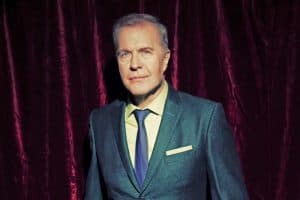
SAS: They’re actually playing at the city hall; so, we’re going to go and see them. It’s a funny thing: I work with Martin all the time, and never get to see them… because, normally, they’re on before us – so, I’m either getting ready or backstage, or something – and so, some of my friends were like, “Well, why don’t we go and actually enjoy the show?” so, we’re going. We’ve done a load of things with them. We did a very big British tour with them, and with Heaven 17, a few years ago – because we’re all from Sheffield – but I would say that Martin’s music is a little bit more melodic, and they’re a bit more glitzy than we are…. We’re a bit less tuneful, really; if that makes any sense. They’re a great band! Martin’s lovely; so, we’re really looking forward to seeing them on Friday.
MD: Was there a thriving Sheffield music scene happening in the early ‘80s?
SAS: Yes. I think because – and I don’t know how your economy was then – our economy, in the UK at the time, especially in the north of England, was dying on its feet. Sheffield was famous for its stainless steel, and all the steel factories were all closing, all the mines were closing, and there was no work; and so, I think a lot of young people who left school with nothing – they didn’t have anything at all – got into art in some way – and some of our friends became actors, some people went into music, some became artists – but, I think, sometimes it’s the only way that you can get out of yourself… when there’s nothing else to do. I think that was the main catalyst, really: was that there were no jobs up here.
MD: Yeah, you’ll find that a lot of working class areas produce the best music; it’s amazing. I guess that’s part of the reason why…. There’s the famous story about you and Joanne being discovered when you were teenagers, and asked to join the band; but what kind of music were you into before you were a part of the Human League?
SAS: Me and Joanne were huge Gary Numan fans, and we really liked Japan and Roxy Music and David Bowie; so, I suppose it all fits in, really.
MD: Absolutely! Was there any discussion about…when you joined the band…what kind of music you were going to be doing? Because the band was in a state of flux at that point, right?
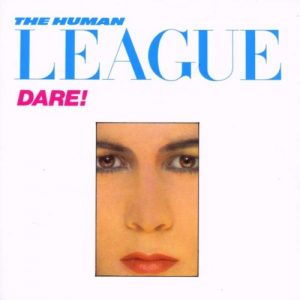 SAS: It was, but it was already on its path of what it was going to be, and I don’t think there was any thought of ever changing, or anything like that, and we just joined in with what was already there, really. There was no instigation, from either Joanne or I, to change anything.
SAS: It was, but it was already on its path of what it was going to be, and I don’t think there was any thought of ever changing, or anything like that, and we just joined in with what was already there, really. There was no instigation, from either Joanne or I, to change anything.
MD: Did you have any idea, at that point, that this would be the thing you would be doing for the next thirty five years or so?
SAS: Thirty seven, actually, to be very truthful! Um, no, no! I think even the lads that were in the group at the time: I think we all thought that it would just be a couple of years’ thing. I genuinely thought I’d end up going to university, which was the thing I didn’t do – I was supposed to be finishing my higher education at school, and then going to university, but, of course, that all fell through – but at the time, I think I thought, “Well, I can always go back to that. I’ve got my grades; I can still go to university;” I think that’s what I thought. Then there have been times, as the years went along, when we weren’t popular and we got dropped by our record label, and then I think we all started to think, “Oh goodness! What are we going to do? We’ve got no skills, or anything! All we’ve ever done is been in a pop group for our whole lives!” I think that was all a bit scary, but it’s amazing, after all these years, we’re still doing it. I still have to pinch myself sometimes and think, “Wow! I can’t believe this is still happening!”
MD: How many times would you say you’ve sung Don’t You Want Me?
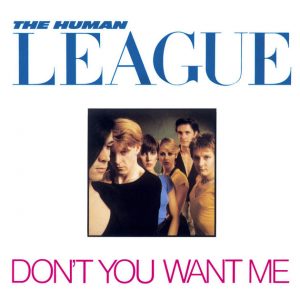 SAS: I don’t know, but I get asked a few questions every single time; and one of the questions people ask me is, “Do you get bored of singing it?” and I can honestly – hand on heart – say, “No, I never get bored of singing it.” I think it’s one of the reasons why we’re still going after all this time; it’s a great song. The songs are the reason, I think, why we’re still here. People like the songs. They’re not that interested in Joanne, Philip and me anymore, because we all look slightly different, and we’re not trying to be in the public eye all the time; but it’s the songs that have stood the testament of time. I have sung Don’t You Want Me many, many times, but I never get bored of singing it. It’s the reason, probably, why I’m talking to you now, isn’t it?
SAS: I don’t know, but I get asked a few questions every single time; and one of the questions people ask me is, “Do you get bored of singing it?” and I can honestly – hand on heart – say, “No, I never get bored of singing it.” I think it’s one of the reasons why we’re still going after all this time; it’s a great song. The songs are the reason, I think, why we’re still here. People like the songs. They’re not that interested in Joanne, Philip and me anymore, because we all look slightly different, and we’re not trying to be in the public eye all the time; but it’s the songs that have stood the testament of time. I have sung Don’t You Want Me many, many times, but I never get bored of singing it. It’s the reason, probably, why I’m talking to you now, isn’t it?
MD: It probably is! Yeah, absolutely! What can you tell me about the recording session itself, when the record was actually made? How do you remember it?
SAS: It was funny: we were recording at Martin Rushent’s studio down at Genetic in Goring-on-Thames – actually, where George Michael was found dead; George had a house down there – we were recording there, but Martin used to co-own the studio with another couple of producers. So, they used to work days, and they were working days with Madness, and we were working nights on our album; so, we crossed paths – as they were leaving to go home, we were just coming in – and we did it in the middle of the night; that’s what I remember the most: is that we just recorded it in the middle of the night.
MD: You mentioned a bunch of other groups that were happening at the same time. Was there a feeling of camaraderie, or a feeling that you guys were all part of a similar…?
SAS: Oh no! Rivalry! Massive rivalry! Although, now, if we see the guys from Madness or the Spandau lads or Duran Duran, or anyone like that, we’re all really good mates; but at the time, no, it was real rivalry; you wanted your record to beat them! You’d be at Top Of The Pops – which used to be the biggest TV music show in the UK – and you’d all be stood around, and no one would talk to each other; it was really funny! It’s only as years have gone on, that you actually start to talk to people. In fact, it’s funny: the last time we came to Australia, Madness were on the same bill as us – we did the V Festival in Australia – and I remember sat on the plane with one of them, and he was saying, “Do you remember what it was like when we never used to talk to each other at Top Of The Pops?” Oh, god! It’s so funny! But yeah, we were rivals, and we didn’t want to be mates with anyone.
MD: I think, when you play Australia next time, you’re touring with Culture Club; so, there you go.
SAS: No, we’re only doing one show with Culture Club.
MD: Oh, only one show; okay.
SAS: The rest of the shows are, actually, on our own. They’ve asked us just to do the Perth show with them; so, that’s all we’re doing.
MD: I see…. I’m American – as you can probably tell from my accent – and so, I was introduced to all of you folks from MTV, and watching all of that stuff with the music videos; and it all seemed to be this concerted… another British invasion. Was it that organised, or was it just a thing that happened?
SAS: I think it was just a thing that happened. Obviously, we, the groups from the early ‘80s, were amazingly lucky because of MTV. We were number one in America, and that was amazing! We would never have been number one in America had it not been for MTV, because, as you know, America is such a huge country, you can’t get around it very quickly. You can’t get everywhere, and because the radio stations – I don’t know if it’s still the same; I suspect that it still is – are very sectioned off: there’s country, there’s rock, there’s pop, there’s soul and disco, and stuff like that; and never the two shall meet. If you listen to Kiss FM in LA, its all one type of music; and if you didn’t cross over, then you weren’t going to get in the charts. Whereas, MTV smashed all that to pieces, and they just played, virtually, everything. I know there was a little bit of conflict at first, because they didn’t play very much black music, did they? I know they didn’t play very much Michael Jackson, and stuff like that. That was when VH1 – I remember when we went to work with Jimmy and Terry in Minneapolis – VH1 was the thing then, because it was all the really great black music, and things. But no, MTV smashed all that to pieces, which allowed all of groups to…would Culture Club have been thought of as a reggae band? Would they have crossed over into the pop thing? How on earth would they have categorised those sorts of things? All that sort of thing was incredibly helpful to us.
MD: And, of course, the video for Don’t You Want Me was hugely important. Did you have any idea – when you were recording that and filming that – that that would have such an impact on your career?
SAS: No…. Heart Like A Wheel was the first video we’d ever made, and to be truthful, it was rubbish; it wasn’t very good. And we didn’t do the video for Love Action until after we’d done Don’t You Want Me. Don’t You Want Me was filmed on film, and not on video, which makes it look very different. I don’t think we had any concept; and I remember the… first time I saw it, was, actually, when it was on TV, when it was on Top Of The Pops. I remember sitting in my hotel room in Liverpool – we were doing a show – and I thought, “Oh wow! This is quite good;” but no, we had no idea that it was going to be so successful. When you look back at it, it’s pretty amateurish, really, when you see what people do nowadays, but it changed our lives.
MD: And it’s part of the charm. It is what it is. It’s from that era, and you wouldn’t want it any other way at this point, I guess. So, what can expect from your show when you come here?
SAS: Well, obviously, we’ll be playing songs that you know. We’re not going to not play the songs that everyone’s expecting; that would be silly of us! We’re just about to start rehearsal, and I think we’re going to put, at least, one or two surprises in there for you; so, we’ll have to see how they go in rehearsals!
MD: I’m amazed, at this point, that you still have to rehearse!
SAS: We don’t have to, but I think if you don’t, you don’t do as good a show. I think we’re very into that, it’s still a show, it’s still a job; even though we’ve been doing it for years, we can’t be lazy about it. So yeah, we’ve got a couple of weeks of rehearsals before we come.
Click here for tickets and more information to see The Human League in Auckland.